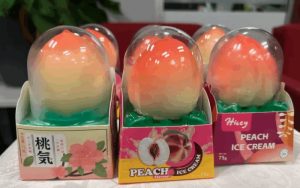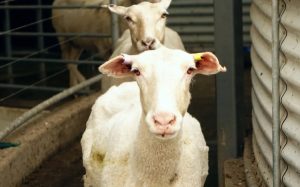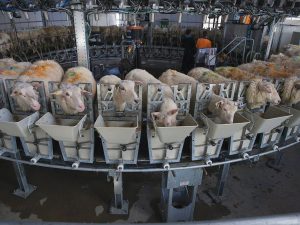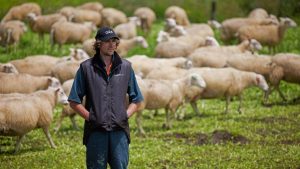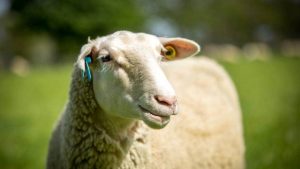
This article first appeared in our sister publication, Dairy Farmer.
When one talks about dairy farming, cows immediately spring to mind. But bovines are facing greater competition from other milking breeds such as sheep. On a global scale, sheep milking is a billion-dollar industry and here in New Zealand it is gathering momentum.
About 250 people attended a Spring Sheep Milk Co open day at Parininihi ki Waitōtara’s (PKW) Koetuku farm at Hawera.
Attendees heard about the two organisations’ roles and future plans in the sheep dairying industry and were given the opportunity to watch a milking session and visit the farm’s lamb-rearing barn.
Spring Sheep Milk Co is a New Zealand-owned joint venture between Pāmu and SLC Ventures. The company has always aimed to create a national integrated sheep milking industry.
Michael Ahie, a member of the establishment board that created PKW and current chair of Spring Sheep Milk said: “Only 20 people attended our first open day, whereas 600 attended a recent Waikato open day. Milking sheep has gone from being a quirky idea to Spring Sheep Milk now being the southern hemisphere’s largest integrated sheep-milking company.
“Our aim was to create an integrated sheep-milking industry and an alternative, legitimate land-use option. It’s quite a courageous move for PKW to get involved.”
Nick Hammond, Spring Sheep Milk Co co-founder and chief executive officer, emphasised that the day was a very special and iconic moment, celebrating sheep milking coming to Taranaki. He acknowledged the PKW leadership as innovators and pioneers creating a pathway for future Taranaki sharemilkers.
“Globally, sheep milking is a billion-dollar industry. New Zealand is the best in the world at pastoral farming and has the best farmers, dairy processors and exporters,” Hammond said.
“Sheep milk presents a very unique opportunity for us to change dairy and create opportunities for New Zealanders to benefit through a scaled, sustainable farming model.”
Hammond emphasised the need to operate a very robust business model and have multiple markets for their products.
“We need multiple growth channels to match the amount of milk coming into Spring Sheep Milk. The world is very dynamic. Having a balanced portfolio enables us to go to different markets at different times, which is critical for ensuring a scalable supply.”
PKW farms 1550 Spring Sheep Zealandia sheep. The breed represents unique breeding lines from the best dairy sheep genetics sourced from Europe and NZ.
Traditional meat and wool breeds typically produce 90-150 litres of milk per year, which would not be profitable. Zealandia sheep produce over 350 litres per year and the breed is the world’s highest performing dairy sheep breed.
Dion Tuuta, chair of PKW, described the company’s vision as “He Tangata, He Whenua, He Oranga – sustaining and growing our people through prosperity”. Over the last generation PKW has been on a journey to regain control of their perpetually leased land, and to convert it into active opportunities for their whānau.
“The sheep farms are a living example of what can be achieved when you have opportunity, collective action, and the desire to make change. I’m very proud of the way the team has gone about establishing this farm with the whanau,” Tuuta said.
PKW had looked at many diversification opportunities, and continue to do so. They say milking sheep aligns with their skill set.
Studies have shown that sheep’s milk is more digestible than cow’s milk. The company is creating an ultra-premium position for sheep milk and a great deal of the company’s growth is coming from consumer groups who struggle to digest cow’s milk.
Sheep milk is also high in protein and calcium. It’s the ideal base for a product range for the “mid seniors” consumer group.
The “senior generation” is the world’s fastest growing demographic and the company has recently launched a product for “mid seniors”. In China, they represent one third of the country’s consumer spend and more people are now turning 65 than there are being born.
Spring Sheep Milk has always sold out of milk within a couple of months of the season’s end. The company still experienced huge growth through the fractious times of covid and disruptions in China.
Its next step is to expand and diversify into North America, Saudi Arabia and the Middle East.
“North America is one of the world’s biggest sheep milk product importers of nearly US$1 billion [$1.6b] per annum. The Middle East is the world’s second biggest importer of infant formula. Any one of these markets could take our total volume,” Hammond said.






